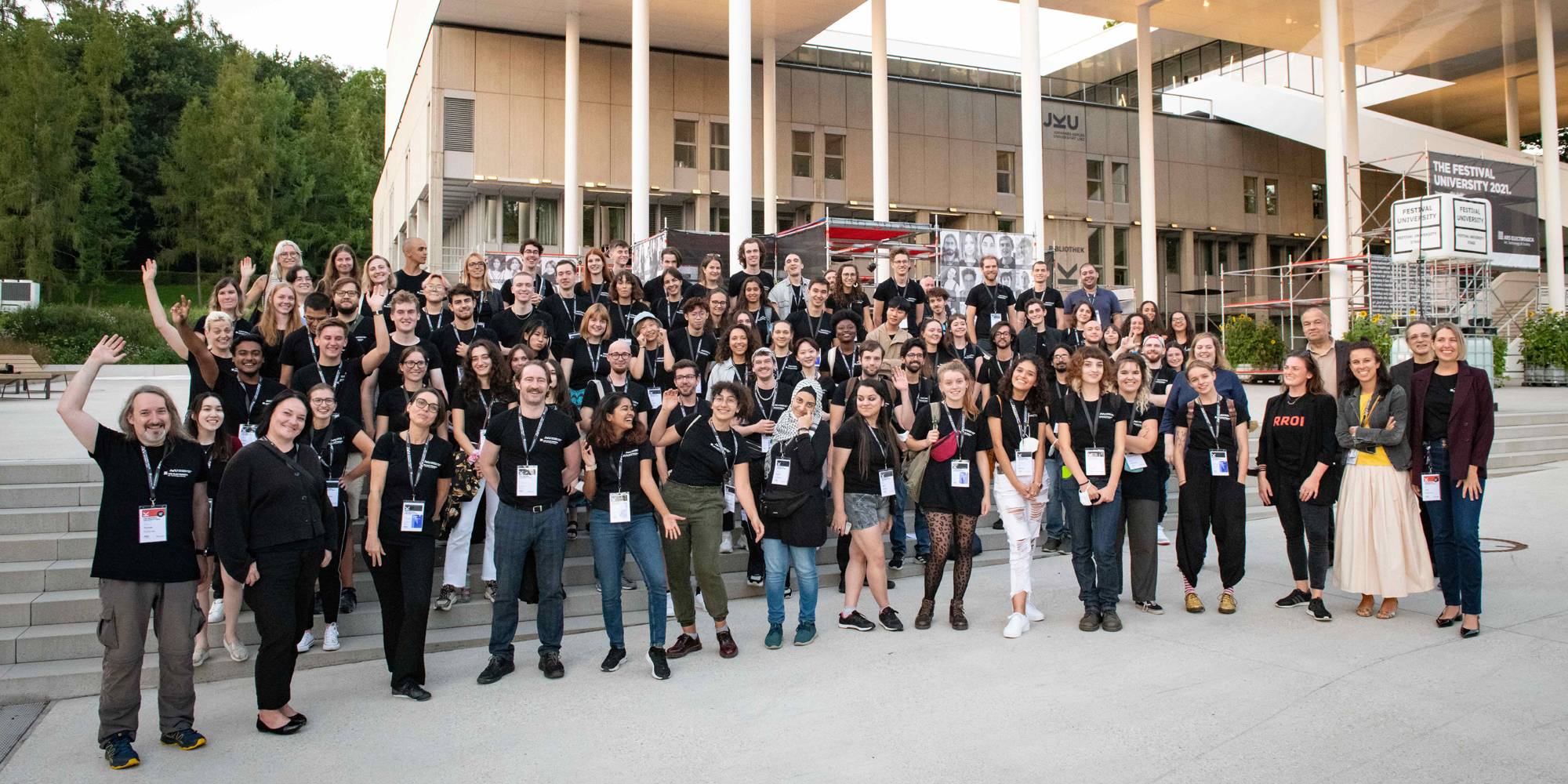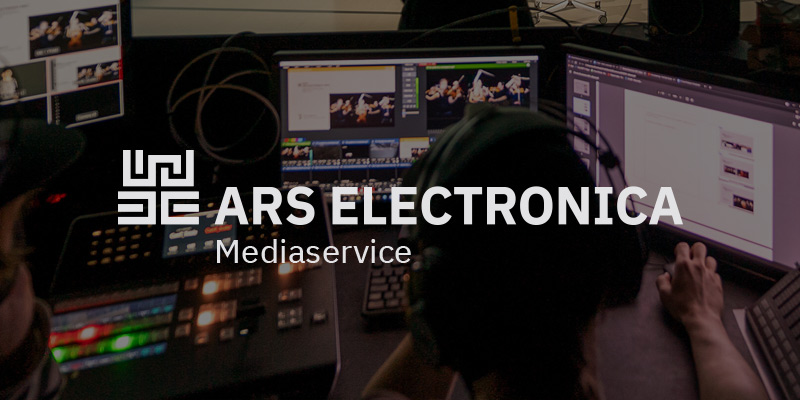press release as PDF
wWebsite Festival University
Festival University am Ars Electronica Blog
Presse-Akkreditierung Ars Electronica Festival
Presse-Events Ars Electronica Festival
The Summer University organized by Johannes Kepler University Linz and Ars Electronica will be held for the second time from August 18 to September 14. 200 students from around 70 countries will explore the question of how we as a global community can deal with the effects of climate change. Guided by renowned international experts, they will develop strategies and solutions and experience the complexity of one of the greatest challenges of our time in a model international environmental court.
The Festival University is a visionary joint project of JKU and Ars Electronica, which was first implemented in the summer of 2021. It was a field test that had a lasting effect. Not only has the Festival University doubled in length (four weeks instead of two) and scope (200 participants instead of 100) this year, but demand was even greater than last year, as JKU Rector Meinhard Lukas explains: “More than 800 students from all over the world applied. Among the 200 participants selected are young people from around 70 countries from all corners of the globe and from completely different disciplines ranging from cultural studies, social sciences or law to technology or medicine. This cultural and professional diversity makes the Festival University a prototype of a ‘university of the 21st century,’ where internationality and diversity are not just words, but lived values.”
Ars Electronica CEO Gerfried Stocker adds: “‘Welcome to Planet B’ is the theme of the 2022 Ars Electronica Festival, and what could be more fitting than to place the second edition of the Festival University under precisely this motto? This will give 200 young people from virtually every corner of the globe the chance to exchange ideas with the most creative media artists, the most renowned researchers, the most innovative developers, the most determined activists of our time, to learn from them and, in turn, to contribute their wishes, hopes and concerns to the process of shaping of our future together. The pairing of the Ars Electronica Festival and the Festival University creates the blend of internationality, interdisciplinarity, interculturality, creativity and publicity that we need in order to develop images and strategies for the future in which all of us — not just a few — can find ourselves.”
Rector Meinhard Lukas also emphasizes the importance of the Festival University for the location and thanks the Federal Ministry of Education, Science and Research, which is providing the necessary funding of 1.6 million euros for the Festival University: “The great worldwide interest in the Festival University is an expression of the charisma of our campus, which will soon be home to two universities, Johannes Kepler University Linz and the newly founded Institute of Digital Sciences Austria. It also confirms the potential offered by cooperation between science and art. My thanks go to the Federal Ministry of Education, Science and Research for making this unique summer university possible for Linz as a university town and a cultural and industrial location.”
Martin Polaschek, Minister of Education, Science and Research: “Pupils and students from about 70 countries are taking part in the Festival University at JKU Linz and Ars Electronica. These figures speak once again for this successful project at Linz as a university location. What’s more, the theme of this year’s Festival University is more topical than ever. The Festival University builds interdisciplinary bridges to find answers to the complex question of global responsibility toward our planet and the next generations. It’s very gratifying that interest in the Summer University is so great and that young people are grappling with the important question of how our world can remain livable for future generations.”
A program that builds bridges
The focus of this year’s program is the Ars Electronica Festival’s theme “Welcome to Planet B! A different life is possible. But how?”. However, the focus is not only on climate change and its effects, but also on the important question of how we as a global community can respond to the challenges. How can we shape our coexistence so that our earth remains livable for future generations?
JKU Rector Meinhard Lukas: “This progress of society into ‘Planet B’ will ultimately only succeed through cooperation and dialogue — because climate change knows no borders. The Festival University program builds on this idea and invites participants to use their great cultural and professional diversity to build bridges between people, countries and disciplines.
A model international environmental court
The program focuses on a mock international environmental court: divided into seven groups, the students will simulate an international court that aims to protect the environment and conduct negotiations based on typical problems involving three main topics (water, energy and migration). Real political issues such as the overexploitation of raw materials, EU taxonomy regulations or climate refugees will be dealt with in mock proceedings.
This is intended to illustrate the complexity and multi-layered nature of climate change as a global problem — and how important dialogue and compromise are for finding solutions. The focus is less on the legal aspects than on the students adopting different perspectives in a dialectic process and conducting sound research on problems or arguing their solutions in a well-founded (scientific) manner. The court simulation is led by University Professor Mathis Fister from the JKU Institute of Administrative Law.
The courtroom simulation can be experienced live by visitors during the Ars Electronica Festival (September 9-11) on the forecourt of the Learning Center on the JKU campus and will also be streamed online.
An international faculty
Over the entire four-week period of the Festival University, the students will be accompanied and supported by an international faculty consisting of academics and top-class experts from the fields of art, culture, journalism, business and civil society. Among others, former Federal Minister and EU Commissioner for Agriculture Franz Fischler, Nafeez Mosaddeq Ahmed (Director of the Global Research Communications – RethinkX; Special Investigations & Global Trends Reporter — Byline Times), Head of BBC News Lab Miranda Markus, Mike Artner from Fridays for Future, Afghan journalist Emran Feroz, Karen Palmer (Storyteller from the Future), Sarah Newman (Co-Founder — Data Nutrition Project, Director of Art & Education at metaLAB at Harvard), Manthia Diawara (filmmaker, cultural theorist, scientist, art historian), Ernst Ulrich von Weizsäcker (environmental scientist, former member of the German Bundestag and former vice president of the Club of Rome), Jayati Ghosh (development economist, chairwoman of the Center for Economic Studies NJU), Giulia Foscari (architect, founder of UNLESS, project leader Antarctic Resolution) as well as JKU scientists such as Barbara Krumay (JKU Institute of Information Systems) and Thomas Gegenhuber (JKU Linz Institute of Technology) will participate in the program and convey methodological and technical knowledge from different disciplines and perspectives to the students in exciting interactive lectures, panel discussions, hands-on workshops and excursions. This year, for the first time, the JKU Medical Campus will also be the venue for the Festival University: Among other things, students will experience “Virtual Anatomy” in JKU medSPACE, which was developed by the Ars Electronica Futurelab team. More info on the international faculty and all the contributors: https://www.jku.at/festival-university/vortragende/
Facts about the Festival University 2022
• Period: August 18 to September 14 (four weeks)
• Place: Linz and surroundings
• Participants:
o 200 students between the ages of 16 and 25 from around 70 countries (e.g. Brazil, Costa Rica, USA, Canada, Austria, Czech Republic, Denmark, Italy, Japan, Lebanon, Taiwan, Nigeria, Australia). They represent six out of seven continents. Their professional backgrounds are diverse and range from cultural studies, social sciences or law to technology or natural sciences.
o 29 of the 200 have already participated in the Festival University last year.
o A total of more than 800 pupils and students applied for these 200 places.
• Language: English
• Time required: Full time
• Credits: Participants will receive a Festival University certificate with 6 ECTS.
• Costs: For the participants, all costs of flight (economy), accommodation and meals will be covered on site.
• Program:
o Inspired by this year’s Ars Electronica Festival, the Festival University follows the motto “Welcome to Planet B! A different life is possible. But how?” and deals with climate change and its effects.
o Workshops, panel discussions and lectures by and with international experts, artists, scientists and managers impart knowledge, stimulate reflection and encourage participants to overcome professional boundaries.
o The focus is on a simulation of an international environmental court that is open to the public as part of the Ars Electronica Festival.
o The program is rounded off by excursions in Linz and the surrounding area (e.g. to the Memorial in Gusen).
• Funding: The necessary funding for the Festival University in the amount of 1.6 million euros is provided by the Federal Ministry of Education, Science and Research.
• More info: https://www.jku.at/festival-university/


